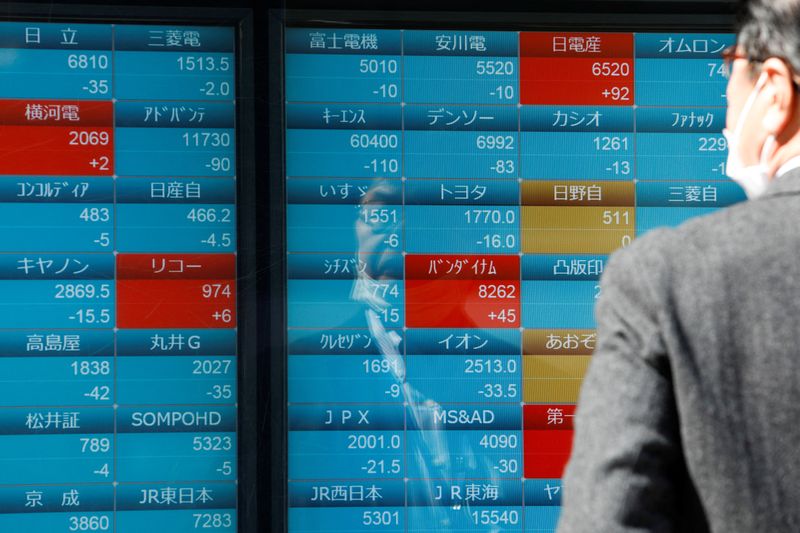Asian shares bounce on global tech rally, yen loser of the week
By Stella Qiu
SYDNEY (Reuters) -Asian shares bounced on Friday, buoyed by a rally in global chipmakers, while the yen was set to end the week with heavy losses as investors pared back bets the Bank of Japan would soon abandon its uber-easy policies.
The stock rally is set to spill over to European markets, with EUROSTOXX 50 futures up 0.4%. The tech-heavy Nasdaq 100 futures climbed another 0.3%, after hitting a record high overnight.
In Asia, MSCI's broadest index of Asia-Pacific shares outside Japan rallied 1.0% on Friday, but was still down 2.7% for the week as jitters about the global interest rate outlook dominated.
Taipei-listed shares of Taiwan Semiconductor Manufacturing (TSMC) surged 6.3% after the chipmaking giant projected 2024 revenue growth of more than 20%. Its U.S. shares soared nearly 10% overnight, fuelling a broad tech rally on Wall Street.[.N]
Japan's Nikkei rose 1.3% to just a touch below a 34-year top hit on Wednesday. Data showed Japan's core consumer inflation slowed for a second straight month in December, adding to speculation that the BOJ is not in a rush to tighten its ultra loose monetary policy.
The yen lost 0.2% to 148.48 per dollar, having fallen almost 2.5% for the week to the lowest level since early December. [FRX/]
Chinese stocks slipped again after bouncing off five-year lows a day before on signs of state support. Chinese bluechips fell 0.3% while Hong Kong's Hang Seng index eased 0.2%. [.SS]
Thomas Mathews, a senior markets economist at Capital Economics, expects decent near-term gains in Chinese equities, forecasting the MSCI China index will rise 15% by the end of the year.
"If we're right that the economy will gather a bit more momentum this quarter, sentiment could turn. But this is a fairly near-term story: with Chinas structural problems set to come back into focus before long, we don't project big gains in the country's equities over the longer run."
Data overnight showed that U.S. weekly jobless claims unexpectedly dropped, adding to signs of the resilience in the economy which tempered some hopes of a March interest rate cut from the Federal Reserve.
Futures were still leaning towards a first rate cut in March from the Fed but with less conviction at a 55% probability, down from 70% last week. Meanwhile, the total easing this year stood at 140 basis points.
The U.S. dollar index, which measures the greenback against a basket of major currencies, was little changed on the day but has gained 0.9% this week as central bank officials pushed back against the aggressive easing expectations priced in by markets.
Treasuries held mostly steady in Asia but are also set for heavy weekly losses. The 10 year yield rose 2 basis points to 4.1593%, up 21 basis points for the week, while the two-year yield held at 4.3651% and up 23 bps on the week.
Atlanta Fed President Raphael Bostic said he would be open to reducing U.S. interest rates sooner than he had anticipated if inflation fell faster than he expected.
The European Central Bank (ECB) also warned in minutes from its most recent meeting that it was far too soon to discuss policy easing.
Oil prices were on edge amid worries about increasing geopolitical risks in the Middle East. The U.S. launched new strikes against Houthi anti-ship missiles aimed at the Red Sea on Thursday, while Pakistan conducted strikes inside Iran, two days after Iranian strikes inside Pakistani territory.
U.S. crude futures were flat at $74.12 per barrel and Brent futures were at $78.99, down 0.1% on the day.
Spot gold eased 0.1% to $2,020.69 an ounce.












 Bitcoin
Bitcoin  Ethereum
Ethereum  Tether
Tether  XRP
XRP  USDC
USDC  Solana
Solana  TRON
TRON  JUSD
JUSD  Figure Heloc
Figure Heloc